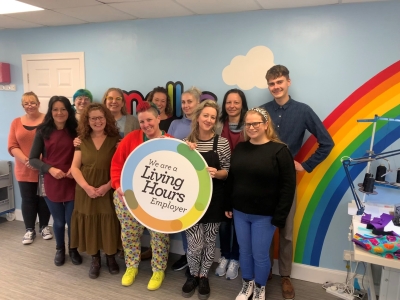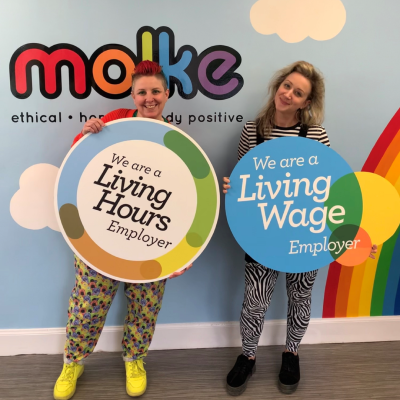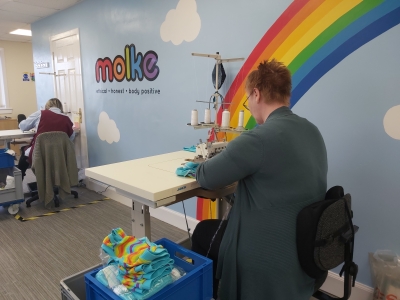Molke is a Scottish manufacturer and retailer of ethical, supportive and comfortable non-wired underwear and swimwear. Officially started back in 2016, Molke demonstrates leadership in a female dominated, notoriously low-paying sector.
We spoke with Kirsty Lunn, Founder and Creative Director, about why being a Living Hours and Living Wage Employer is important to Molke.

What made you want to become a Living Hours Employer?
We became a Living Wage employer back in 2019, as treating our staff with respect has always been crucial to the business and an essential part of what we do. When the Living Hours accreditation came up, we went straight for it. It felt like a no brainer for us.
I think it should be an essential part of any business. People need to be able manage their work-life balance and be able to plan ahead, knowing what hours they will be working and what money they are getting in.
How has being a Living Hours employer benefited Molke as a business?
I think providing people with a good working environment, along with a real living wage and secure hours, is the very least you can do as an employer. But it also certainly gives back to the business - you've got people who are willing to show up and wanting to work.
We’ve also noticed that it has benefited our recruitment, and when we are hiring for new roles, we get a lot more applicants wanting to work for us. The staff turnover at Molke is low, so we are saving resources as we’re not having to constantly recruit, spend time on the admin and time on training people. If we had a high turnover of staff, we would struggle to plan and we wouldn’t know if we were making enough products to meet the demand.

Have you had any specific feedback from employees working at Molke?
We’ve worked hard to create a safe and approachable environment where staff can give us positive feedback, but also constructive criticism. I feel really privileged to have had employees approach me and say how valued and safe they feel at work; we’ve even had employees tell us that they never want to leave! Our employees feel listened to, as well as respected. I’ve spent time working in some awful places - which I hated. I wanted to create a space where our employees never have to feel that way at work. Our Living Wage and Living Hours accreditation means we can provide stability, safety and respect to our employees.
Have you had any experience of working on low pay or insecure hours?
I’ve worked in a number of different roles and never quite found what was right for me until I set up my own business. I’ve turned up for shifts before and been told at the door ‘no, we don’t need you today’ and been sent home - you can’t live like that. I didn’t realise how damaging this was when I was younger. People need to be able to plan, especially if you have a family.
In one role, I was on a contract where we were paid a standard weekly amount, regardless of the hours we worked – which was often over 48 hours a week. These roles have given me some great experience, which has helped me as an employer. To have these accreditations means that our employees won’t have to worry about when they are next working, and how much they’re working for.
What was the process like in becoming a Living Hours employer?
The process was incredibly simple, the application was straight forward and there was constant communication with the team. Once we were accredited, they came out to visit us in Perthshire (Scotland) to take photos of us and get to know our business better. Signing up to the Living Wage and Living Hours standards didn’t feel like any other accreditation we’ve been through; there was always fantastic communication and support.
We still hold close relationships and connections with the Scottish Living Wage team off the back of our accreditations, which is really positive and reassuring.

Do you have any advice for employers looking to become a Living Hours employer?
I know that it’s been a hard couple of years, and it is still incredibly difficult for businesses right now, but it is possible to sign up and become an accredited employer. I would encourage more business to do so.
It is a simple process and they will really see the value and benefit it has for employees and businesses. Becoming a Living Hours employer demonstrates your commitment to your workers and will boost morale, allowing workers to have a healthy work-life balance.
Have you faced any challenges due to being a real Living Wage and Living Hours employer?
Like many other businesses, a lot of our costs soared due to the cost-of-living crisis and Brexit. It was really important for us to budget and look at what we needed to change, in order to allow us to continue paying our staff a fair wage. We looked into how we could provide our staff with a 10% wage increase, in line with the 10% increase in the cost-of-living.
It’s no surprise that costs do go up, but we should still be able to pay our staff a fair wage so that they can carry on being able to afford to live a decent life. It’s not fair as a business to have a huge increase of costs and then drop the wages to account for it. That’s not how a viable business should operate.
Find out how to become an accredited Living Hours employer here.
Find out more about the scale and impact of insecure employment in London.
